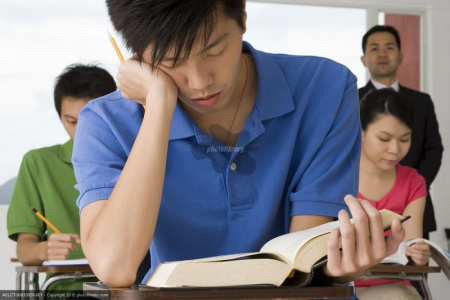|
|
双语校园:“节后综合症”搅乱学生心(图) 课上很多学生精神不振
新的一学期就要开始了。寒假的过度自由让不少刚返校的学生都患上了“节后综合症”(post-holiday syndrome):很多学生出现食不知味、夜不能寐、上课打哈欠等症状。对此,专家们给出了怎样的建议呢? 新的一年开始了。在家闲晃了漫长寒假的学生们返校后总会出现这个老问题--春季学期开始后,学生们总要重新适应校园生活--而这个过程则被他们称为“假日忧伤”或“节后综合症”。 THE new year always brings an old problem for students who return to campus after a long winter holiday spent lounging around at home. As the spring semester begins, some students find themselves having to adapt to college life all over again - a process they refer to as "the holiday blues", or "post-holiday syndrome"。 19岁的大连科技大学学生冉亚星说,这意味着她不得不重新适应学校食堂粗糙的饭菜。寒假回家(中国南部广东)前,她迫不及待地想要摆脱它们。更糟糕的是,她还要在灯光昏暗的自助餐厅排长队买饭,由于餐桌脏乱不堪,她总是快速吃完后就离开。 For Ran Yaxing, a 19-year-old at Dalian University of Technology, this means re-acclimating herself to the heavy canteen food she was all too eager to leave behind when she went south to her home in Guangdong. Even worse, she must once again queue up in a dingy cafeteria and eat quickly at messy tables。 “这感觉不像在享受美食,倒好像在和食物打架。”冉亚星说,刚回来那几天,她一点儿胃口都没有。“我花了整个学期的时间适应北方风味,现在却只能从头再来。” "It's like fighting with the food instead of enjoying it," Ran said, explaining that she lost her appetite during her first days back. "I spent a whole semester getting used to the flavor here in the north, and now I have to do it all over again." 除了饮食问题,学生们舒适的生活环境也将一去不复返。他们不得不和舍友们一起住在拥挤的宿舍中。19岁的江城寒假期间住在天津。家里宽敞不说,装修也很精致。回到位于武汉的湖北科技大学后,设备就简单多了:光秃秃的木板床上就铺了几张毯子。整个身体酸痛不止,十分渴望回到天津柔软舒适的加大型床上。 Students must also return to the uncomfortable confines of life with roommates in a crowded dormitory. Just ask 19-year-old Jiang Cheng, who lived in a spacious, well-decorated home in Tianjin over the break. Now back in Wuhan at Hubei University of Technology, Jiang is sleeping on a wooden board and a few blankets. His body is aching to be back in his soft king-size bed in Tianjin。 “我肯定患了假日忧伤,”他说,“一点儿也高兴不起来。” "I've definitely got the holiday blues," he said. "I cannot make myself happy at the moment." 提前返校能有效治疗“节后综合症”? Early return remedy? 中国科技大学21岁的曲萌在这方面很有经验,也很了解冉亚星、江城等人的困扰。 Veterans like Qu Meng, a 21-year-old at the University of Science and Technology of China, know just what freshmen like Ran and Jiang are going through。 一年前,曲萌也有相似的经历。但今年就好多了。因为他决定在新学期开始前几天返校。多数学生在新学期开始时才返校,而曲萌的提早返校就让自己有时间来调整身心,更早地适应校园生活。 Qu experienced similar feelings a year ago. But not this year. That's because Qu decided to return to campus a few days before the semester began. Most students come back just as the semester gets underway. Qu's early return gave him time to readjust his body, and his mind, to campus life。 “是一个师兄教我这么做的。因此,我可以在被论文和作业压垮前重新适应校园生活。”他说。到目前为止,早返校的学生们似乎都已经摆脱了假日忧伤的烦恼。 "An upperclassman gave me the tip, so that I could readapt to college life before feeling overwhelmed by all the essays and assignments," he said. So far, the early return seems to have kept the holiday blues at bay。 专家建议:无需慰藉 No sympathy 深圳某心理咨询中心的心理学家李军表示,寒假返校后,很多学生感到忧郁、状态不佳。 Li Jun, a psychologist at a Shenzhen-based consultation center, says many students report feeling glum and not in the best shape upon returning to campus after the winter holiday。 但是,李军并不建议他们采用药物治疗或寻求心理帮助。相反,她建议冉亚星、江城等学生能够在寒假中更加活跃。 But Li isn't about to recommend that they pop some pills or seek psychological help. Instead, she suggests that, next time around, students like Ran and Jiang stay more active during the winter break。 李军还说,假期期间经常运动、坚持正常作息将带来很大不同--甚至能将节后综合症扼杀在摇篮中。 Li says exercising and sticking to a normal schedule over the holidays will make a world of difference - and nip post-holiday syndrome in the bud。 “放假期间学生们没有工作量。但这并不表示他们要停止动手动脑,”李军说,“坚持一贯的生活节奏是避免节后综合症的一大要素。” "Just because students don't have a workload on vacation doesn't mean that they need to stop using their brain and body," Li said. "Keeping a consistent life pace is one of the keys to avoid getting post-holiday syndrome." 网友评论
${图铃下载}
企业服务 |
||||||||||||||||







